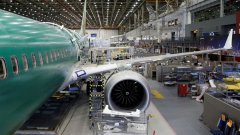
GM, , said it was "disappointed by the escalation of this unnecessary and irresponsible strike."
"It is harming our team members who are sacrificing their livelihoods and having negative ripple effects on our dealers, suppliers, and the communities that rely on us," the company said, later adding it's "time for us to finish this process."
More than 45,000 UAW members at the Detroit automakers, or roughly 31% of union members covered by the expired contracts, are now on strike. Another 7,000 or so, or about 5% of the workers, have been laid off due to ripple effects of the strikes, according to the companies.
The strike began on Sept. 15 with walkouts for each of the automakers at assembly plants in Michigan, Missouri and Ohio. They have since grown to include eight assembly plants and 38 parts distribution centers in 22 states.
The strike at the Arlington plant comes a day after the UAW for in Sterling Heights, Michigan, and nearly two weeks after a walkout at that's responsible for $25 billion annually in revenue for . The unannounced walkouts at profitable facilities represent what Fain has called a of bargaining with the Detroit automakers.
The union had earlier threatened GM's Arlington plant.
On Oct. 6 Fain said the UAW was planning a walkout at the facility until GM made a to include workers at the company's joint-venture battery cell plants in the company's master agreement.
However, it appears that progress has since stalled: Fain told reporters Monday that talks regarding the battery cell plants were "dead in the water," declining to elaborate on where the discussions stood.
GM CEO said during the company's third-quarter investor call Tuesday that discussions to include battery plant workers "under the scope of the national agreement" remained open, but said the current focus is for workers at the joint venture, known as Ultium, to negotiate their own deal with the union.




